|
The long wait is over. Both the Bank of Japan and the Federal Reserve delivered their respective policy announcements Wednesday. And both did more or less what was expected. The Federal Reserve left its policy unchanged while the Bank of Japan made changes to its quantitative and qualitative easing (QQE) programs. The BoJ's changes did not match what analysts thought they would do. However, global equities rallied on the news while bond yields gyrated and the U.S. currency tumbled against its major counterparts (except the pound sterling).
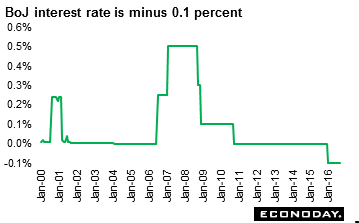 The Bank of Japan left its policy interest rate unchanged at minus 0.1 percent as expected. The BoJ will also continue to purchase JGBs at an annual rate of ¥80 trillion, again as expected. However, something new was added. The Bank will now adjust these purchases to target a zero percent yield for the 10-year JGB. This means the Bank will use the shape of the yield curve to implement policy rather than the pace of monetary expansion. The monetary policy board (MPB) also tweaked its inflation target. Now the target is above 2.0 percent as soon as possible rather than within a specific time period so that its average level will be closer to the target over the longer term. The Bank of Japan left its policy interest rate unchanged at minus 0.1 percent as expected. The BoJ will also continue to purchase JGBs at an annual rate of ¥80 trillion, again as expected. However, something new was added. The Bank will now adjust these purchases to target a zero percent yield for the 10-year JGB. This means the Bank will use the shape of the yield curve to implement policy rather than the pace of monetary expansion. The monetary policy board (MPB) also tweaked its inflation target. Now the target is above 2.0 percent as soon as possible rather than within a specific time period so that its average level will be closer to the target over the longer term.
The new framework follows a "comprehensive assessment" of the effects on economic activity and prices of previous policy measures. Among the tweaks to monetary policy the BoJ announced on Wednesday was a decision it would now favor purchasing ETFs that track the market-capitalization weighted Topix index over those that follow the price-weighted Nikkei 225.
The scale of its quantitative easing program was kept on hold, with overall asset purchases "more or less in line with the current pace" — currently ¥80 trillion a year. However the BoJ has scrapped the maturity target in its bond-buying program, a move which could potentially ease the pressure on banks from negative interest rates. Currently, the average remaining maturity of the government bonds the BoJ buys is set at 7 to 12 years.
In a speech delivered earlier this month Governor Haruhiko Kuroda had defended the BoJ's push into negative interest rates which, introduced in January, has caused consternation among Japanese lenders. Mr Kuroda made a frank acknowledgement that negative rates would have a financial cost but made it plain that further cuts were not off the table.
 As expected, the Federal Reserve left its key fed funds rate range at 0.25 percent to 0.50 percent. The vote by the FOMC was 7 to 3. The three that voted against the decision to maintain its fed funds rate — Kansas City Fed President Esther George, Cleveland Fed President Loretta Mester and Boston Fed President Eric Rosengren — were looking for a rate increase at this meeting. The FOMC also said the economy had gotten a bit stronger after some shaky results in the spring. The Fed said the argument for raising rates has "strengthened." The Fed last raised interest rates in December 2015. As expected, the Federal Reserve left its key fed funds rate range at 0.25 percent to 0.50 percent. The vote by the FOMC was 7 to 3. The three that voted against the decision to maintain its fed funds rate — Kansas City Fed President Esther George, Cleveland Fed President Loretta Mester and Boston Fed President Eric Rosengren — were looking for a rate increase at this meeting. The FOMC also said the economy had gotten a bit stronger after some shaky results in the spring. The Fed said the argument for raising rates has "strengthened." The Fed last raised interest rates in December 2015.
The FOMC's assessment of the economy was little changed from the July meeting with economic growth described as moderate with a little less emphasis on the strength of the labor market. Household spending was once again described as strong and business investment was once again described as soft. The inflation assessment was unchanged — namely running below target. Global risks were once again cited but not expanded upon.
| |
|
2015 |
2016 |
% Change |
|
Index |
Dec 31 |
Sep 16 |
Sep 23 |
Week |
2016 |
| Asia/Pacific |
|
|
|
|
|
|
| Australia |
All Ordinaries |
5344.6 |
5396.7 |
5518.65 |
2.3% |
3.3% |
| Japan |
Nikkei 225 |
19033.7 |
16519.3 |
16754.02 |
1.4% |
-12.0% |
|
Topix |
1547.30 |
1311.50 |
1349.56 |
2.9% |
-12.8% |
| Hong Kong |
Hang Seng |
21914.4 |
23335.6 |
23686.48 |
1.5% |
8.1% |
| S. Korea |
Kospi |
1961.3 |
1999.4 |
2054.07 |
2.7% |
4.7% |
| Singapore |
STI |
2882.7 |
2827.5 |
2856.95 |
1.0% |
-0.9% |
| China |
Shanghai Composite |
3539.2 |
3002.9 |
3033.90 |
1.0% |
-14.3% |
|
|
|
|
|
|
|
| India |
Sensex 30 |
26117.5 |
28599.03 |
28668.22 |
0.2% |
9.8% |
| Indonesia |
Jakarta Composite |
4593.0 |
5267.8 |
5388.91 |
2.3% |
17.3% |
| Malaysia |
KLCI |
1692.5 |
1653.0 |
1670.99 |
1.1% |
-1.3% |
| Philippines |
PSEi |
6952.1 |
7553.8 |
7723.60 |
2.2% |
11.1% |
| Taiwan |
Taiex |
8338.1 |
8902.3 |
9284.62 |
4.3% |
11.4% |
| Thailand |
SET |
1288.0 |
1479.1 |
1492.88 |
0.9% |
15.9% |
|
|
|
|
|
|
|
| Europe |
|
|
|
|
|
|
| UK |
FTSE 100 |
6242.3 |
6710.3 |
6909.43 |
3.0% |
10.7% |
| France |
CAC |
4637.1 |
4332.5 |
4488.69 |
3.6% |
-3.2% |
| Germany |
XETRA DAX |
10743.0 |
10276.2 |
10626.97 |
3.4% |
-1.1% |
| Italy |
FTSE MIB |
21418.4 |
16192.2 |
16452.84 |
1.6% |
-23.2% |
| Spain |
IBEX 35 |
9544.2 |
8633.4 |
8823.60 |
2.2% |
-7.6% |
| Sweden |
OMX Stockholm 30 |
1446.8 |
1405.3 |
1437.52 |
2.3% |
-0.6% |
| Switzerland |
SMI |
8818.1 |
8130.4 |
8272.89 |
1.8% |
-6.2% |
|
|
|
|
|
|
|
| North America |
|
|
|
|
|
|
| United States |
Dow |
17425.0 |
18123.8 |
18261.40 |
0.8% |
4.8% |
|
NASDAQ |
5007.4 |
5244.6 |
5305.75 |
1.2% |
6.0% |
|
S&P 500 |
2043.9 |
2139.2 |
2164.69 |
1.2% |
5.9% |
| Canada |
S&P/TSX Comp. |
13010.0 |
14450.8 |
14697.93 |
1.7% |
13.0% |
| Mexico |
Bolsa |
42977.5 |
45922.9 |
47778.480 |
4.0% |
11.2% |
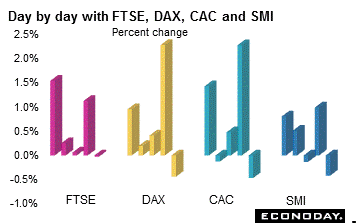 European equities advanced last week after retreating the previous two weeks. The markets relished Thursday's rally but were lower on profit taking Friday. The FTSE was up 3.0 percent, the CAC jumped 3.6 percent, the DAX climbed 3.4 percent and the SMI added 1.8 percent. Thursday's rally was in response to the Federal Reserve's decision to hold interest rates at current levels triggering a weaker U.S. dollar. The drop in the dollar sparked a rally among commodities, which meant big gains for mining, gold and energy stocks. Banks and financial stocks also continued to benefit from the Bank of Japan's actions as well. European equities advanced last week after retreating the previous two weeks. The markets relished Thursday's rally but were lower on profit taking Friday. The FTSE was up 3.0 percent, the CAC jumped 3.6 percent, the DAX climbed 3.4 percent and the SMI added 1.8 percent. Thursday's rally was in response to the Federal Reserve's decision to hold interest rates at current levels triggering a weaker U.S. dollar. The drop in the dollar sparked a rally among commodities, which meant big gains for mining, gold and energy stocks. Banks and financial stocks also continued to benefit from the Bank of Japan's actions as well.
UK financial institutions stand to lose their "passporting" rights. The rights allow them to operate freely across Europe. According to European Central Bank governing council member and Bundesbank President Jens Weidmann, the rights would automatically cease to apply if Great Britain is no longer at least part of the European Economic Area (EEA). Passporting rights are crucial for British financial institutions, many of whom operate from London and provide services across the EU. These rights eliminate the need for individual licenses to operate in different European countries. Losing passporting rights could deal a severe blow to London's status as a financial services hub and many institutions would consider relocating their headquarters, Weidmann said.
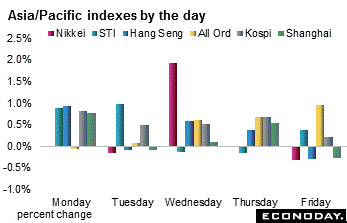 Equities advanced last week after the uncertainty surrounding the Bank of Japan and Federal Reserve announcements faded. Most indexes gained more than 1.0 percent. The Sensex edged up 0.2 percent while the Taiex jumped 4.3 percent. The Nikkei added 1.4 percent while the Hang Seng and Shanghai Composite were 1.5 percent and 1.0 percent higher. The Topix (see equities table) jumped 2.9 percent. The Topix instead of the Nikkei will serve as the basis for the Bank of Japan's ETF purchases. Some analysts were surprised by the strength of the markets' reaction here to the FOMC decision even though it was thoroughly anticipated and the risk of higher interest rates hasn't gone away. Equities advanced last week after the uncertainty surrounding the Bank of Japan and Federal Reserve announcements faded. Most indexes gained more than 1.0 percent. The Sensex edged up 0.2 percent while the Taiex jumped 4.3 percent. The Nikkei added 1.4 percent while the Hang Seng and Shanghai Composite were 1.5 percent and 1.0 percent higher. The Topix (see equities table) jumped 2.9 percent. The Topix instead of the Nikkei will serve as the basis for the Bank of Japan's ETF purchases. Some analysts were surprised by the strength of the markets' reaction here to the FOMC decision even though it was thoroughly anticipated and the risk of higher interest rates hasn't gone away.
Japanese shares rallied after the Bank of Japan left interest rates unchanged and took additional steps to stimulate inflation. The Topix closed 2.71 percent higher Wednesday after the central bank announced it would adjust its exchange-traded fund purchases to buy more ETFs tracking the Topix. The decision sparked buying, particularly in the financial sector, as concerns eased that the BoJ would cut rates deeper into negative territory — which would hit bank profits among other effects.
The All Ordinaries was up 2.3 percent last week — the index's first positive week since the week of August 12. The new Reserve Bank of Australia Governor Philip Lowe told a parliamentary panel in Sydney that his colleagues have not been overly fixated on keeping inflation in a narrow range. Lowe replaced long time governor Glenn Stevens who retired.
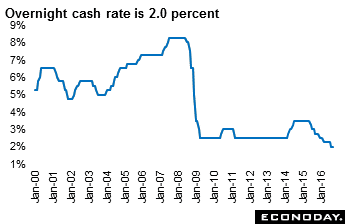 The Federal Reserve and Bank of Japan were not the only central banks to meet during the week. The RBNZ left its policy overnight cash rate (OCR) at 2.0 percent where it has been since July. However, in his statement governor Graeme Wheeler noted that more rate cuts will likely be needed in coming months to help push inflation back into the RBNZ's 1.0 percent to 3.0 percent target range. Headline inflation has been below the target range since late 2014, reflecting declines in global oil prices, weaker prices for tradable goods and a relatively strong local currency. In response to this weakness in price pressures, the RBNZ has cut the OCR five times since early 2015, most recently in July by 25 basis points to a record low of 2.0 percent. The Federal Reserve and Bank of Japan were not the only central banks to meet during the week. The RBNZ left its policy overnight cash rate (OCR) at 2.0 percent where it has been since July. However, in his statement governor Graeme Wheeler noted that more rate cuts will likely be needed in coming months to help push inflation back into the RBNZ's 1.0 percent to 3.0 percent target range. Headline inflation has been below the target range since late 2014, reflecting declines in global oil prices, weaker prices for tradable goods and a relatively strong local currency. In response to this weakness in price pressures, the RBNZ has cut the OCR five times since early 2015, most recently in July by 25 basis points to a record low of 2.0 percent.
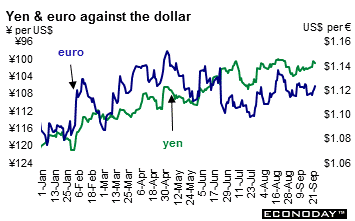 The U.S. dollar retreated last week against its major counterparts with the exception of the pound sterling. The U.S. currency was lower against the euro, yen, Swiss franc and the Canadian and Australian dollars. The U.S. dollar declined mid-week after the Federal Reserve did not increase its policy fed funds rate. The yen gyrated despite repeated intervention warnings from Japanese officials. The U.S. dollar retreated last week against its major counterparts with the exception of the pound sterling. The U.S. currency was lower against the euro, yen, Swiss franc and the Canadian and Australian dollars. The U.S. dollar declined mid-week after the Federal Reserve did not increase its policy fed funds rate. The yen gyrated despite repeated intervention warnings from Japanese officials.
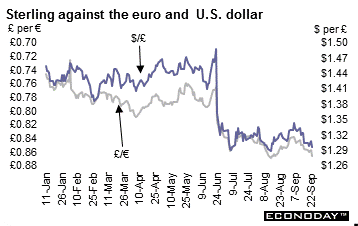 The pound sterling ended the week below the $30.00 mark as uncertainty over the economic fallout from Brexit continued to weigh on the currency. Sterling's decline came even though the Federal Reserve did not raise interest rates and cut back on the number of future increases in 2017. Investors also appeared to be unsettled by the lack of consensus over the timing of when the UK would leave the EU. The pound sterling ended the week below the $30.00 mark as uncertainty over the economic fallout from Brexit continued to weigh on the currency. Sterling's decline came even though the Federal Reserve did not raise interest rates and cut back on the number of future increases in 2017. Investors also appeared to be unsettled by the lack of consensus over the timing of when the UK would leave the EU.
|
|
2015 |
2016 |
% Change |
|
|
Dec 31 |
Sep 16 |
Sep 23 |
Week |
2016 |
| U.S. $ per currency |
|
|
|
|
|
|
| Australia |
A$ |
0.7288 |
0.749 |
0.762 |
1.7% |
4.5% |
| New Zealand |
NZ$ |
0.6833 |
0.727 |
0.724 |
-0.3% |
6.0% |
| Canada |
C$ |
0.7231 |
0.757 |
0.759 |
0.3% |
5.0% |
| Eurozone |
euro (€) |
1.0871 |
1.116 |
1.123 |
0.7% |
3.3% |
| UK |
pound sterling (£) |
1.4742 |
1.302 |
1.296 |
-0.4% |
-12.1% |
|
|
|
|
|
|
|
| Currency per U.S. $ |
|
|
|
|
|
|
| China |
yuan |
6.4937 |
6.675 |
6.669 |
0.1% |
-2.6% |
| Hong Kong |
HK$* |
7.7501 |
7.759 |
7.756 |
0.0% |
-0.1% |
| India |
rupee |
66.1537 |
66.985 |
66.655 |
0.5% |
-0.8% |
| Japan |
yen |
120.2068 |
102.340 |
101.040 |
1.3% |
19.0% |
| Malaysia |
ringgit |
4.2943 |
4.131 |
4.114 |
0.4% |
4.4% |
| Singapore |
Singapore $ |
1.4179 |
1.368 |
1.360 |
0.6% |
4.3% |
| South Korea |
won |
1175.0600 |
1121.870 |
1102.410 |
1.8% |
6.6% |
| Taiwan |
Taiwan $ |
32.8620 |
31.634 |
31.363 |
0.9% |
4.8% |
| Thailand |
baht |
36.0100 |
34.910 |
34.635 |
0.8% |
4.0% |
| Switzerland |
Swiss franc |
1.0014 |
0.9807 |
0.9697 |
1.1% |
3.3% |
| *Pegged to U.S. dollar |
|
|
|
|
|
|
| Source: Bloomberg |
|
|
|
|
|
|
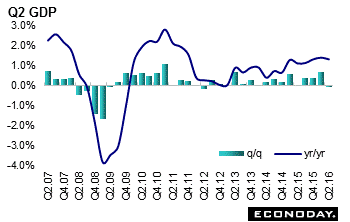 Final second quarter gross domestic product was revised downward to 0.1 percent below its level in the previous period. Annual growth was also shaded revised downward to 1.3 percent. The revision reflected weaker household spending which now posts a 0.1 percent quarterly contraction from the originally reported flat performance. Elsewhere, business capital investment was unrevised at minus 0.4 percent and government consumption still rises 0.4 percent. Domestic final sales were unchanged over the period and stocks still subtract 0.7 percentage points. Final second quarter gross domestic product was revised downward to 0.1 percent below its level in the previous period. Annual growth was also shaded revised downward to 1.3 percent. The revision reflected weaker household spending which now posts a 0.1 percent quarterly contraction from the originally reported flat performance. Elsewhere, business capital investment was unrevised at minus 0.4 percent and government consumption still rises 0.4 percent. Domestic final sales were unchanged over the period and stocks still subtract 0.7 percentage points.
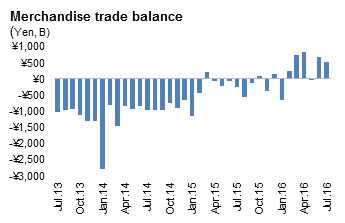 August merchandise trade deficit was ¥18.7 billion. This followed a surplus of ¥513.5 billion in July. This was the third monthly trade deficit so far this year, although the balance for the year as a whole remains well in surplus. The move into deficit reflected a drop of 9.6 percent in exports from a year ago. Ongoing strength in Japan's currency continues to weigh on external demand, with exports down on the year to Asia (down 9.4 percent), China (down 8.9 percent), and the United States (down 14.5 percent). Exports to the European Union, however, were close to flat. Imports tumbled 17.3 percent on the year. This was the twentieth consecutive decline, with lower global oil prices remaining a major factor driving the weakness in headline imports. August merchandise trade deficit was ¥18.7 billion. This followed a surplus of ¥513.5 billion in July. This was the third monthly trade deficit so far this year, although the balance for the year as a whole remains well in surplus. The move into deficit reflected a drop of 9.6 percent in exports from a year ago. Ongoing strength in Japan's currency continues to weigh on external demand, with exports down on the year to Asia (down 9.4 percent), China (down 8.9 percent), and the United States (down 14.5 percent). Exports to the European Union, however, were close to flat. Imports tumbled 17.3 percent on the year. This was the twentieth consecutive decline, with lower global oil prices remaining a major factor driving the weakness in headline imports.
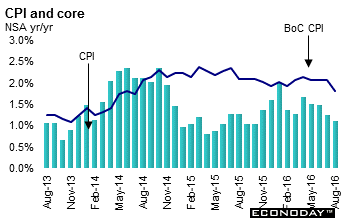 August consumer prices declined 0.2 percent on the month and were up 1.1 percent from a year ago — the lowest reading since October 2015. The CPI excluding food and energy and the Bank of Canada's core CPI were both only flat on the month, reducing the yearly rate of the former from 2.1 percent to 1.9 percent and of the latter from 2.1 percent to 1.8 percent. This was the first time that both annual rates have been sub-2 percent since February. On a seasonally adjusted basis, both the CPI and CPI excluding food & energy were down 0.1 percent on the month while the Bank of Canada measure was flat. Within the adjusted basket, the overall decline was led by recreation, education & reading where prices decreased 0.4 percent. Food (down 0.1 percent) was the only other area to have a negative impact. Most other categories saw small monthly gains apart from health & personal care which was up 0.5 percent. August consumer prices declined 0.2 percent on the month and were up 1.1 percent from a year ago — the lowest reading since October 2015. The CPI excluding food and energy and the Bank of Canada's core CPI were both only flat on the month, reducing the yearly rate of the former from 2.1 percent to 1.9 percent and of the latter from 2.1 percent to 1.8 percent. This was the first time that both annual rates have been sub-2 percent since February. On a seasonally adjusted basis, both the CPI and CPI excluding food & energy were down 0.1 percent on the month while the Bank of Canada measure was flat. Within the adjusted basket, the overall decline was led by recreation, education & reading where prices decreased 0.4 percent. Food (down 0.1 percent) was the only other area to have a negative impact. Most other categories saw small monthly gains apart from health & personal care which was up 0.5 percent.
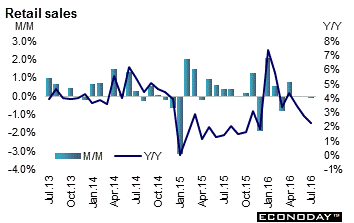 July retail sales were down 0.1 percent on the month but up 2.3 percent on the year, its weakest posting since last December. However, the headline decline was biased down by falling prices with volumes increasing 0.3 percent from June. The overall monthly nominal fall reflected decreases in five of the eleven reporting subsectors. Among these, gasoline (3.0 percent) had a sizeable impact as did furniture & home furnishings (1.4 percent). Motor vehicles & parts (down 0.2 percent) were lower for the fourth time in five months. Partial offsets were provided by clothing & accessories (1.6 percent), building material & garden equipment & supplies (1.5 percent) and miscellaneous stores (1.6 percent). July retail sales were down 0.1 percent on the month but up 2.3 percent on the year, its weakest posting since last December. However, the headline decline was biased down by falling prices with volumes increasing 0.3 percent from June. The overall monthly nominal fall reflected decreases in five of the eleven reporting subsectors. Among these, gasoline (3.0 percent) had a sizeable impact as did furniture & home furnishings (1.4 percent). Motor vehicles & parts (down 0.2 percent) were lower for the fourth time in five months. Partial offsets were provided by clothing & accessories (1.6 percent), building material & garden equipment & supplies (1.5 percent) and miscellaneous stores (1.6 percent).
The Federal Reserve, Bank of Japan and Reserve Bank of New Zealand announced their respective monetary policy decisions. Both the Fed and RBNZ left their respective policies unchanged while the BoJ altered its QQE programs. Equities advanced while the U.S. dollar declined. There was little new economic data during the week.
OPEC will hold an informal meeting on the sidelines of an international energy forum Wednesday in Algiers. Reaching an agreement to curtail supplies of crude is questionable. During the week, Japan will report its key monthly data including industrial production, consumer prices, retail sales, household spending and unemployment.
| The following indicators will be released this week... |
| Europe |
|
|
| Sep 26 |
Germany |
Ifo Survey (September) |
| Sep 27 |
Eurozone |
M3 Money Supply (August) |
| Sep 29 |
Germany |
Unemployment Rate (September) |
|
Eurozone |
EC Business & Consumer Sentiment (September final) |
| Sep 30 |
Eurozone |
Harmonized Index of Consumer Prices (September flash) |
|
Eurozone |
Unemployment Rate (August) |
|
Germany |
Retail Sales (August) |
|
France |
Consumption of Manufactured Goods (July, August) |
|
UK |
Gross Domestic Product (Q2.2016 final) |
| |
|
|
| Asia/Pacific |
|
|
| Sep 29 |
Japan |
Retail Sales (August) |
| Sep 30 |
Japan |
Consumer Price Index (August) |
|
|
Unemployment (August) |
|
|
Household Spending (August) |
|
|
Industrial Production (August) |
| |
|
|
| Americas |
|
|
| Sep 30 |
Canada |
Monthly Gross Domestic Product (July) |
|
|
Industrial Product Price Index (August) |
Anne D Picker is the author of International Economic Indicators and Central Banks.
|

